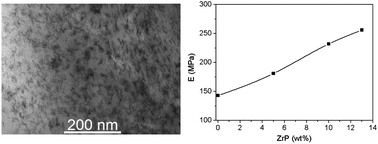Aqueous dispersions of a short side chain perfluorosulfonic acid ionomer (equivalent weight 830 g eq.−1) and gels of nanosized zirconium phosphate (ZrP) in propanol are used for the preparation, by solution casting, of composite membranes with ZrP loading up to 13 wt%. These membranes, together with reference neat ionomer membranes, are characterized by mechanical stress–strain tests and in-plane conductivity determinations under different conditions of temperature and relative humidity (RH). The membrane hydration is also determined under the environmental conditions of mechanical and conductivity measurements. The conductivity of the neat ionomer membrane, at 90 and 120 °C, is weakly dependent on temperature but strongly influenced by changes in RH going from values around 0.02 S cm−1 at 25% RH to values around 0.25 S cm−1 at 90% RH. The conductivity of the composite membranes decreases with increasing filler content being however in the range of 0.01–0.02 S cm−1 at 25% RH and in the range of 0.16–0.23 S cm−1 at 90% RH at both temperatures. On the other hand the presence of the filler results in a significant increase in the Young's modulus (up to 80%) and in the yield stress (up to 124%) not only under ambient conditions but also at 80 °C and 80% RH.

